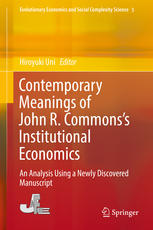

Most ebook files are in PDF format, so you can easily read them using various software such as Foxit Reader or directly on the Google Chrome browser.
Some ebook files are released by publishers in other formats such as .awz, .mobi, .epub, .fb2, etc. You may need to install specific software to read these formats on mobile/PC, such as Calibre.
Please read the tutorial at this link: https://ebookbell.com/faq
We offer FREE conversion to the popular formats you request; however, this may take some time. Therefore, right after payment, please email us, and we will try to provide the service as quickly as possible.
For some exceptional file formats or broken links (if any), please refrain from opening any disputes. Instead, email us first, and we will try to assist within a maximum of 6 hours.
EbookBell Team

4.1
70 reviewsThis book is the first to reinterpret John R. Commons's Institutional Economics with a newly discovered manuscript written in 1927 in order to find its contemporary meanings in economic theories. Commons aimed to establish institutional economics to understand capitalism in the USA of that time, when people’s collective actions were gaining importance with the emergence of powerful labor unions, oligopolistic corporations, and national judicial systems. Setting three types of transactions as his central concepts for analysis, Commons described dynamics of capitalism as multiple and cumulative causal processes of transactions, through which the final goal should be achievements of a "reasonable value". He also believed that the reasonable value could be achieved by the evolution of institutions.
There is no doubt that Commons's ideas proposed in Institutional Economics such as transactions and collective actions greatly inspired later economists; however, few studies have contributed to comprehensive understanding of the origin of his masterpiece. To what extent and in what sense had Commons rejected or accepted previous classical economics or marginalism for constituting his original institutional economics? What are the meanings and limitations that reasonable value may have for contemporary political economy?
Institutional Economics as attempts to resolve deep economic problems at that time. Commons's efforts create important implications for us, those who are living in an era after the global financial crisis and confronting various challenges to political economy.